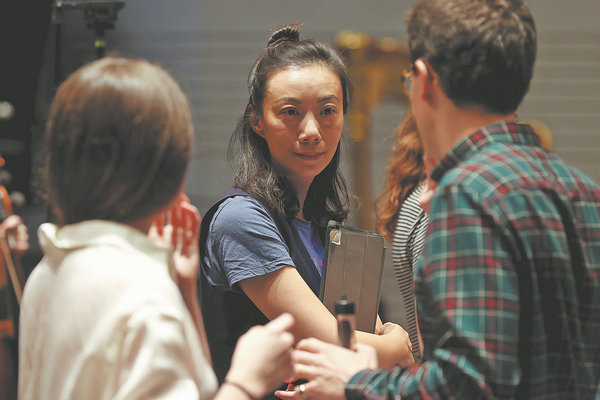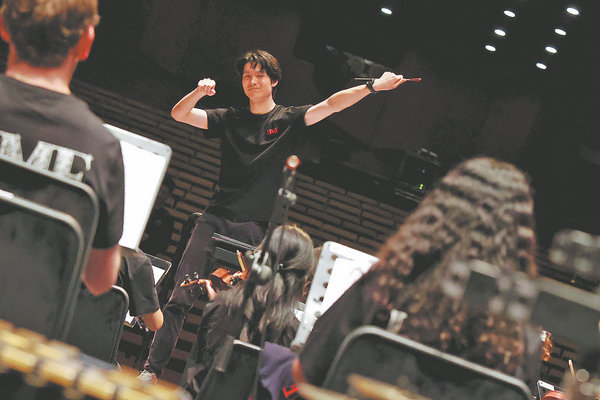

When Wang Ying, a China-born, Berlin-based composer, was invited to write a piece of new music for the 25th and 26th Beijing Music Festival, she was excited, not only because the new work was scheduled to be performed during the closing concert of the festival, but also because the grand finale of the festival took the theme — "New Beginnings".
On Oct 15, Wang's Big Bang was premiered by the Mahler Foundation Festival Orchestra and the Shanghai-based Novus-Classica Camerata, under the baton of conductor Jin Yukuang, bringing an end to the 24-day festival.
"It's a great idea to bring a music festival to an end with the concept of 'new beginnings'. It's an end, but what excites people is that new beginnings follow," says Wang, 47. "It's about new hope."
Big Bang is divided into seven parts, which are closely associated with the universe and its creation. Filled with rhythmic drive, metallic colors and a lot of electronic sounds, Wang portrays the birth and power of the universe. She ends the piece with sounds conjuring upimages of the eternal radiance of the universe.
Besides classical musical instruments, the composer also used contemporary instruments to bring her musical vision alive, such as the electric guitar.
She also used an audio recording, about 35 seconds in length, of the sound from a black hole recorded by NASA, which she incorporated into her composition.
"I am a big fan of British scientist Stephen Hawking (1942-2018). This piece is also dedicated to him," Wang adds.
"It has been about four years since I returned to my home country. I am very happy to have my music staged for the audience, as well as to get back together with my friends here," Wang says.
Zou Shuang, artistic director of the Beijing Music Festival, has been keeping in touch with the composer and following her work for years.
"Her music is original, dramatic, and distinctive. It's always our wish to present music with new ideas to the audience," Zou says.
In the closing concert, pieces such as Gustav Mahler's Lieder eines fahrenden Gesellen (Songs of a Wayfarer) and Sir George Benjamin's At First Light, were also performed. The concert ended with Antonin Dvorak's Symphony No 9, From the New World, under the baton of conductor John Warner from the United Kingdom.

As a composer, Wang writes music for various genres, such as orchestra, ensembles, vocal and chamber music. Born in Shanghai and raised in Beijing, she began her musical education at the age of 4, receiving piano lessons from her father, renowned Chinese composer Wang Xilin.
Wang Ying studied composition at the Shanghai Conservatory of Music, where she graduated in 2002. A year later, she moved to Germany for graduate studies at the Conservatory of Music and Dance Cologne. In 2010, she completed a master's degree in contemporary music at the conservatory. She also studied electronic composition.
In 2011, she studied at IRCAM (Institute for Research and Coordination in Acoustics/Music), an acclaimed music lab in Paris, and deepened her knowledge and skills in avant-garde music theory and approach.
As a female composer, she has been recognized worldwide. In 2012, Wang Ying won the Fifth Biennial Brandenburg Symphony International Composition Competition with her pieces Phantasmagoria from 2008, Steel, Steam, Storm from 2009 and Focus-Fission from 2011.
"I am always looking for new sounds and new possibilities to create music. I have three main tools — the traditional instruments of the classical music genre and their extended techniques, my Chinese musical education and the sounds of electronics. I am interested in many subjects, such as the universe, nature, and the environment," she says.